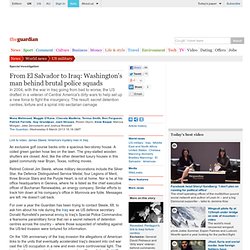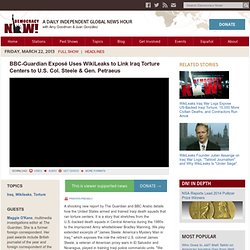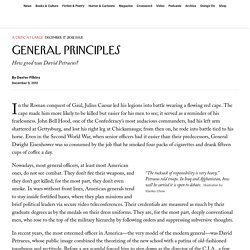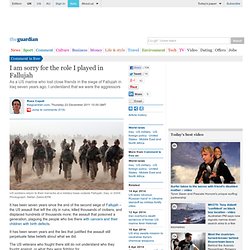

DN! AARON MATÉ: Since the release of Senate findings this month, senior officials from the George W.

Bush administration have defended their global torture program. Speaking to Meet the Press last week, former Vice President Dick Cheney said that with no major terror attack since 9/11, he wouldn’t hesitate to use torture again. DICK CHENEY: With respect to trying to define that as torture, I come back to the proposition torture was what the al-Qaeda terrorists did to 3,000 Americans on 9/11. There is no comparison between that and what we did with respect to enhanced interrogation. ... It worked. AARON MATÉ: The Obama administration and top Democrats have contested Cheney’s claim the torture program was effective, as well as legal. AMY GOODMAN: Instead, from President Obama on down, it’s been taken at face value that protecting the nation was the Bush administration’s sole motive. AMY GOODMAN: President Obama’s comments were echoed by CIA Director John Brennan.
Indicting the US Government for crimes against humanity – unsealing the evidence. It is opportune that only a couple of weeks after three-times human rights awardee Bradley Manning presented his case against the US Government for war crimes committed in Iraq and Afghanistan, details have been released (see video trailer above) of a 15 month investigation by the Guardian and the BBC into torture centres in Iraq, coordinated by US Special Forces commander, James Steele, and former US General Petraeus. Add in evidence of system-wide torture and massacres in Iraq and Afghanistan as compiled by the Bureau of Investigative Journalism (see below) with additional evidence from a number of other sources (also below) and what we have is much more than a dossier but an indictment – unsealed and without need for a grand jury – that could form the basis of charges raised against the US Administration either in the World Court or – deliciously turning the tables – at the military tribunal of Bradley Manning.
From El Salvador to Iraq: Washington's man behind brutal police squads. Link to video: James Steele: America's mystery man in Iraq.

BBC-Guardian Exposé Uses WikiLeaks to Link Iraq Torture Centers to U.S. Col. Steele & Gen. Petraeus. This is a rush transcript.

Copy may not be in its final form. AMY GOODMAN: As we continue to mark the 10th anniversary of the 2003 U.S. invasion of Iraq, we turn today to a shocking new report by The Guardian newspaper and BBC Arabic detailing how the United States armed and trained Iraqi police commando units that ran torture centers and death squads. Dexter Filkins: How Good a General was David Petraeus? In the Roman conquest of Gaul, Julius Caesar led his legions into battle wearing a flowing red cape.

The cape made him more likely to be killed but easier for his men to see; it served as a reminder of his fearlessness. John Bell Hood, one of the Confederacy’s most audacious commanders, had his left arm shattered at Gettysburg, and lost his right leg at Chickamauga; from then on, he rode into battle tied to his horse. Even in the Second World War, when senior officers had it easier than their predecessors, General Dwight Eisenhower was so consumed by the job that he smoked four packs of cigarettes and drank fifteen cups of coffee a day. Nowadays, most general officers, at least most American ones, do not see combat. They don’t fire their weapons, and they don’t get killed; for the most part, they don’t even smoke.
I am sorry for the role I played in Fallujah. US soldiers return to their barracks at a military base outside Fallujah, Iraq, in 2004.

Research links rise in Falluja birth defects and cancers to US assault. The following correction was printed in the Guardian's Corrections and clarifications column, Wednesday 5 January 2011 The story below reported the authors of a study as saying that birth defects in the Iraqi city of Falluja could have been caused by weaponry used in US assaults in 2004, and added by way of background that this suggestion might add to the dispute over whether rounds containing depleted uranium have residual effects.

But a line of explanation went wrong in saying that such rounds "contain ionising radiation to burst through armour". As readers with expertise in this area noted, it is not the radiation emitted by this substance that makes it penetrate armour. Rather, depleted uranium is used because of its density and its melting point, one of whose effects is to produce heat and therefore fires or explosions upon high-speed impact. The report identifies metals as potential contaminating agents afflicting the city – especially among pregnant mothers. US invasion leaves lasting Iraq scars. Marines’ Haditha Interviews Found in Iraqi Junkyard.
Iraq more dangerous than a year ago, U.S. review finds. The findings contrast with public statements by U.S. diplomatic and military officials in Iraq and come as Washington awaits a final decision by Iraqi leaders on whether they want U.S. troops to stay in the country beyond the expiration of a three-year security agreement in December.

U.S. officials have said they are willing to extend the American military presence into 2012 only after receiving a formal request from Iraqi leaders. Iraqi Prime Minister Nouri al-Maliki and other top leaders postponed a meeting scheduled for Saturday to debate any future U.S. military presence, once again dashing hopes of quickly resolving the issue. Maliki instead was scheduled to appear before the Iraqi parliament to defend plans to cut the 46-member cabinet down to 30 members — another long-simmering political dispute that appears far from resolution. Bowen’s report noted that 14 U.S. troops were killed by hostile fire in Iraq in June, the bloodiest month since April 2009. U.S. wastes $34 billion in Afghan and Iraq contracting.